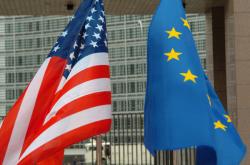
From James Joyner, the New Atlanticist: Admiral Mike Mullen, Chairman of the Joint Chiefs of Staff, generated quite the buzz with his proclamation last week that, "The most significant threat to our national security is our debt." The same could be said for the NATO alliance. …
But the resource constraints that have come from the global recession are now leading countries who have long fallen short of their commitment to spend two percent of their GDP on defense to cut even deeper. And that’s going to make it very difficult to sustain a modern military Alliance. …
As Reuters Political Risk Correspondent Peter Apps pointed out last month, it’s only natural the European politicians will target defense over popular domestic programs. Particularly during bad economic times, which cry out for strengthening the safety net and propping up businesses reeling from the downturn.
But NATO Secretary General Anders Fogh Rasmussen warned that, with the United States already footing three-quarters of the defense spending bill, there is a very real danger that the European forces would face "an extreme technology gap." The political upshot, he correctly observed, was that "we might end up with a situation where the Americans find the Transatlantic relationship less relevant. …"
The best hope, as I noted in "European Defense Cuts: Look on the Bright Side," is that the cuts will force consolidation and integration among European militaries and thus minimize the damage. We’re seeing some promise of that, as with today’s announcement that Britain and France will share aircraft carriers. If that happens, much of the cost savings can come from efficiencies — eliminating unnecessary duplication of capabilities and infrastructure.
James Joyner is managing editor of the Atlantic Council.
Image: STOCK%20-%20Transatlantic%20Relations.warsawbiopic.jpg
